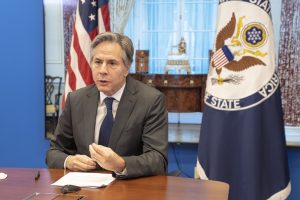U.S. Secretary of State Antony Blinken is due to visit Indonesia and Malaysia next week as the Biden administration continues to augment its diplomatic engagement in Southeast Asia amid China’s growing influence.
I Gede Ngurah Swajaya, Indonesia’s director general for American and European Affairs, told reporters yesterday that Blinken is scheduled to visit Jakarta on December 13-14. Two Southeast Asian diplomatic sources told Reuters that Blinken was also expected to travel to Malaysia on December 14-15.
Blinken’s visit to Jakarta “will initiate an increasingly high-level interaction between Indonesia and the United States in the context of the strategic partnership between the two countries,” Ngurah said, according to Radio Free Asia. While in Indonesia, Blinken is due to deliver a speech on health, investment, and infrastructure in the Indo-Pacific. His trip will also be preceded by his virtual participation in the Bali Democracy Forum on December 9.
The announcement of Blinken’s visit, his first to Southeast Asia as secretary of state, marks a considerable step-up in the pace of Washington’s diplomatic engagement with Southeast Asia. After a slow start in the early months of the Biden administration, the past six months have seen regional tours by U.S. Vice President Kamala Harris, Defense Secretary Lloyd Austin, and Wendy Sherman, the deputy secretary of state. The most recent came last week, when Daniel Kritenbrink, the top U.S. diplomat for East Asia, paid visits to Indonesia, Malaysia, Singapore, and Thailand last week.
It also comes amid a flurry of other developments in U.S. relations with Southeast Asia. Yesterday, Jonathan Kaplan, Biden’s nominee for ambassador to Singapore, finally presented his credentials to President Halimah Yacob, bringing to an end more than four years in which the U.S. had no formal representation there. It also took place as Deputy Secretary of State Sherman met with all 10 ambassadors from the ASEAN nations in Washington.
As per the U.S. State Department, Sherman “emphasized the continued U.S. commitment to combating the COVID-19 pandemic” and “highlighted U.S. focus on providing the region with a positive economic agenda and our partnership to address regional challenges, including freedom of navigation in the South and East China Seas and restoring Burma’s path toward democracy.”
The recent diplomatic offensive is the administration’s attempt to counter China’s rising influence in Southeast Asia, particularly its considerable economic ties to the region, which have, if anything, strengthened since the onset of the COVID-19 pandemic. This has been accompanied by uplifting references to the U.S.-led “rules-based order” and Washington’s promise to advance a ” shared vision for a free, open, interconnected, resilient, and secure region,” as Blinken put it during a meeting with Southeast Asian foreign ministers on the sidelines of the U.N. General Assembly in September.
Despite the evident progress of recent months – showing up, it is often said, is half of the game in Southeast Asia – the U.S. continues to face the same challenges in assembling a coalition of nations that share its view both of Chinese perfidy and of the benefits of U.S. primacy. While Southeast Asian nations have serious worries about Beijing’s growing power, particularly those that face the hard edge of its naval clout in the South China Sea, none have any desire to sacrifice the benefits of economic cooperation with China – the primary driver of Chinese influence in the region.
None, bar perhaps the Philippines, have bought into the Biden administration’s ideological framing of competition with China, a fact encapsulated by the upcoming Democracy Summit, to which just four of Southeast Asia’s 11 nations have been invited.
As it stands, the region is less interested in stirring rhetoric about freedom and openness than American engagement tuned to its material needs, particularly nations’ desire for a road out of the pandemic-induced economic recession. But as I noted last week in relation to Kritenbrink’s trip, economic engagement remains “the question mark that hangs over Washington’s relationship with the region.” While many U.S. officials now recognize the necessity of an economic strategy in Southeast Asia – indeed, Hunter Marston of the Australian National University said this week that it has become a “frequently repeated axiom” in U.S. foreign policymaking circles – it remains to be seen whether such an approach will eventuate, and if so, how significant it will be,
As Michael Green of the Center for Strategic and International Studies told The Wire China recently, the current approach in the Asia-Pacific “is like having Thanksgiving dinner without turkey, just cranberry sauce and stuffing. Meanwhile,” he added, “China is going in offering (our allies) a steak.”

































